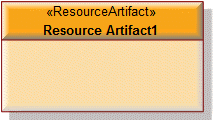Resource artifact (UPDM - MODAF aliases)

Creation
To create a Resource Artifact:
• From an
Architectural Description or
Service Description: right-click the Architectural Description or Service Description, point to New, point to MODAF, point to System, and then click Resource Artifact.
• From a
Resource Artifact: right-click the Resource Artifact, point to New, point to MODAF, point to System, and then click Resource Artifact.
You can convert a Resource Artifact to a
Software: right click the Resource Artifact, point to Convert To, and then click Software.
Appearance
When shown on an
SV-1 Resource Definition,
SV-5 Function to Operational Activity/Service Function Definition,
SV-4 Functionality Hierarchy or
SV-9 Technology and Skills Forecast Definition, a Resource Artifact appears as follows:

When shown on an
SV-1 Resource Interaction Specification or
SV-2 Resource Communications Description, a Resource Artifact appears as follows:

Relationships
The following relationships are of importance to a Resource Artifact:
• UML Generalizations define Resource Artifact inheritance (
SV-1 Resource Definition).
•
Is Capable Of Performing relationships link a Resource Artifact to
Function elements that the Resource Artifact can perform.
• Used as a conveyed classifier for
Operational Exchange elements.
The following sections provide information about how a Resource Artifact is used in the model.
Create a Resource Artifact from
Create from a Resource Artifact
In addition to the UPDM elements that can be created from all UPDM elements (
Alias,
Definition,
Information and
Metadata):
Shown on these diagrams, tables and matrices
In addition to the
AV-2 Integrated Dictionaryand
TV-1 Standards Profile, which can show all UPDM elements:
UPDM writeable properties
The following writeable properties are available on the Resource Artifact tab of a Resource Artifact element's Property Pages:
• isEncapsulated
• URI































